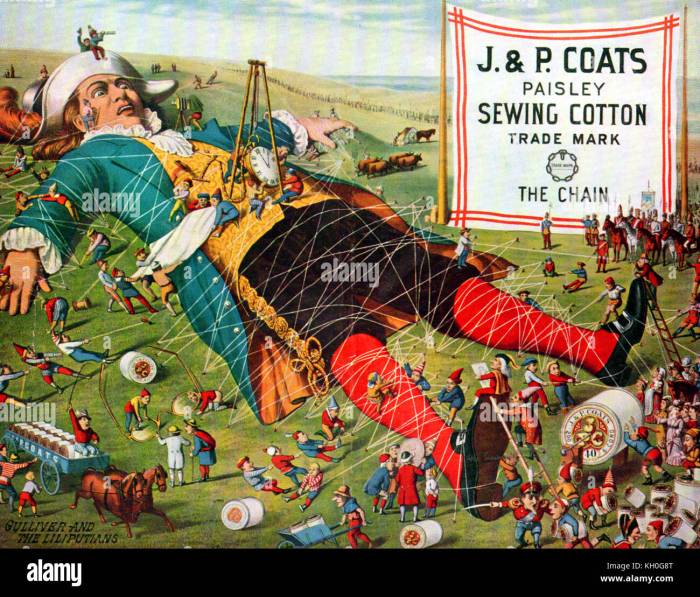Glory from lilliput gulliver’s travel novel – In Jonathan Swift’s satirical masterpiece, Gulliver’s Travels, the concept of glory is intricately explored through the lens of the Lilliputian society. This essay examines the nature, pursuit, and glorification of glory in Lilliput, highlighting its ironic and paradoxical nature.
The Lilliputians’ obsession with glory stems from their diminutive size, which makes them vulnerable and insecure. They seek glory to compensate for their physical inferiority, often engaging in grandiose displays and elaborate rituals to enhance their perceived status.
The Nature of Glory in Lilliput: Glory From Lilliput Gulliver’s Travel Novel
In Lilliput, glory is a highly prized virtue, associated with honor, prestige, and power. It is bestowed upon those who demonstrate exceptional bravery, intelligence, or loyalty. The concept of glory is deeply ingrained in the Lilliputian culture, and it plays a significant role in shaping the society’s values and aspirations.
Characters or Situations that Embody Glory
- The Emperor of Lilliput:As the supreme ruler, the Emperor is the epitome of glory in Lilliput. He is revered for his wisdom, courage, and unwavering commitment to his people.
- Gulliver:Despite being a giant among the Lilliputians, Gulliver’s physical strength and ingenuity earn him the admiration and respect of the Lilliputian people. He is seen as a symbol of glory and protection.
Relationship between Glory and Power
In Lilliput, glory is closely linked to power. Those who achieve glory often rise to positions of influence and authority. The Emperor, for example, derives his power from the glory he has earned through his deeds and accomplishments.
The Pursuit of Glory

Motivations of Characters who Seek Glory
The pursuit of glory is a driving force for many characters in Lilliput. Some seek glory to gain power and influence, while others seek it for the recognition and admiration of their peers. For some, glory is a way to achieve immortality and leave a lasting legacy.
Methods Used to Achieve Glory
- Honorable Methods:Some characters pursue glory through honorable means, such as acts of bravery, loyalty, and service to the kingdom.
- Dishonorable Methods:Others resort to dishonorable methods, such as deceit, manipulation, and even violence, to achieve their goals.
Consequences of Pursuing Glory, Glory from lilliput gulliver’s travel novel
The pursuit of glory can have both positive and negative consequences. On the positive side, it can inspire individuals to achieve great things and contribute to the betterment of society. On the negative side, it can lead to ambition, envy, and conflict.
The Glorification of Gulliver
Gulliver’s Physical Stature and Abilities
Gulliver’s towering stature and immense strength make him a figure of awe and admiration among the Lilliputians. His physical superiority is seen as a manifestation of his glory and power.
Impact of Gulliver’s Actions and Interactions
Gulliver’s actions and interactions with the Lilliputians further enhance his reputation. His kindness, intelligence, and willingness to help those in need earn him the respect and affection of many.
Reasons for the Lilliputians’ Admiration and Fear
The Lilliputians admire Gulliver for his physical prowess, his intelligence, and his compassion. However, they also fear his immense power and the potential threat he poses to their kingdom.
The Irony of Glory
Examples of Irony in the Portrayal of Glory
The novel presents several examples of irony in the portrayal of glory. For instance, the Lilliputians’ admiration for Gulliver’s physical strength is ironic considering their own diminutive size.
Glory as a Source of Pride and a Cause of Downfall
Glory can be both a source of pride and a cause of downfall. In Lilliput, those who achieve great glory may become arrogant and overconfident, leading to their eventual downfall.
Contrast between the Perceived Glory of Lilliput and Its True Nature
The novel contrasts the perceived glory of Lilliput with its true nature. Behind the facade of glory, Lilliput is a society plagued by political intrigue, social inequality, and a thirst for power.
Essential Questionnaire
What is the significance of Gulliver’s physical stature in shaping his glorification in Lilliput?
Gulliver’s immense size makes him a towering figure among the Lilliputians, evoking both awe and fear. This physical advantage contributes to his glorification, as the Lilliputians perceive him as a superior being.
How does Swift satirize the Lilliputians’ pursuit of glory?
Swift satirizes the Lilliputians’ pursuit of glory through exaggerated and absurd situations. For instance, they engage in elaborate contests of jumping and dancing to determine superiority, highlighting the triviality of their endeavors.

